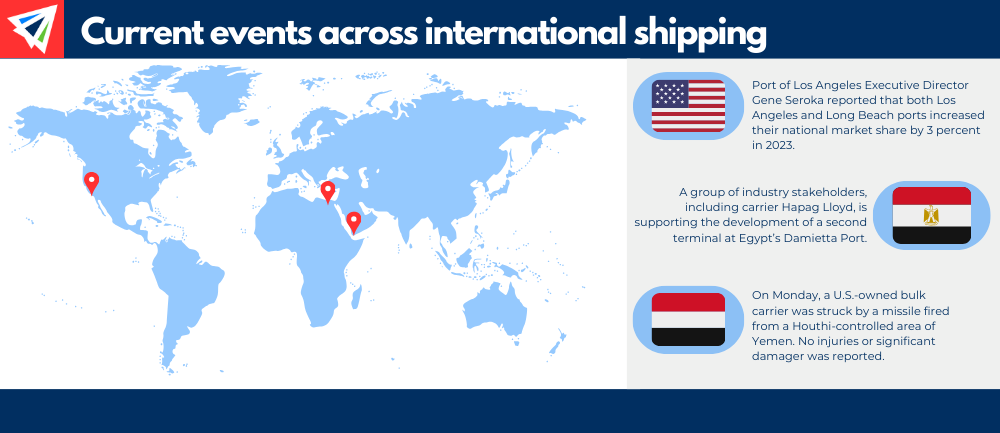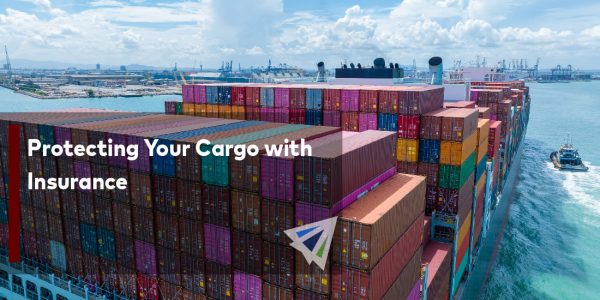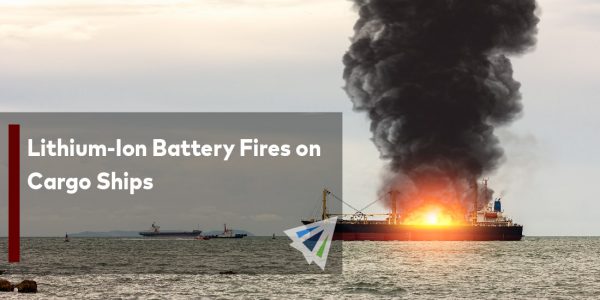Competitive Edge
January 17th, 2024
Stay Current with InterlogUSA
Latest Industry Happenings and Market Updates:

IMPORT: Asia to North America (TPEB)
Recent Developments:
- Major carriers implemented another round of general rate increases (GRIs) on January 15. These increases are in play for most services from Asia to all U.S. coasts.
- Surcharges remain imposed on transits through the drought-hit Panama Canal.
- Carrier services remain transiting around Africa to avoid the Suez Canal. Transit times and rates have increased, while more capacity is being absorbed due to service requirements.
Rates: Rates continue to rise as second-half January GRIs hit the market. Longer transits (avoiding the Suez) will increase shipping demand measured in ton-miles (volume multiplied by distance), a factor further applying upward pressure on rates.
Space: Space has tightened amid external supply chain events.
Capacity: Longer transits averting the canals will absorb vessel capacity in order to maintain weekly services.
Equipment: There are no outstanding equipment deficits or bottlenecks.
TIPS:
- Hold your logistics partners accountable for frequent updates regarding current market conditions and routing impacts.
- Be flexible and adaptive to alternative service options, especially as it relates to potential savings on cost or transit.
- Establish a firm timeline for future import activity as well as a vetted pool of multiple logistics providers.
IMPORT: Europe to North America (TAWB)
Recent Developments:
- Ocean carriers are implementing EU ETS surcharges onto trade lanes to and from E.U. countries to cover newfound costs from the program.
Rates: Rates are steadily rising, however they’re not as high as they were in early December. Low demand continues to anchor levels from any drastic increases.
Space: Space is open.
Capacity: Capacity remains in excess. However, carriers have finally taken steps to address overcapacity by reducing the size of vessels operating on transatlantic lanes. However, blank sailing activity remains minimal.
Equipment: Availability on both origin and destination sides, unless advised otherwise.
TIPS:
- Book at least three weeks prior to the ready date.
- Communicate with your logistics partners to ensure that you’re up to speed on the EU ETS program and its evolving impacts on transatlantic trade.
EXPORT: North America to Asia
Rates: Rates are low and level.
Capacity: Space remains open, particularly from West Coast ports, however exporters continue to see carriers curb their capacities via blank sailings and slow steaming as U.S. import demand remains challenged.
Equipment: Barge services in China will be temporarily suspended in early February due to this year’s Chinese New Year holiday.
TIPS:
- Insufficient communication with sailing schedules can lead to higher detention and demurrage fees as well as higher trucking and storage costs. Ensure your logistics partners are not keeping you and your cargo in the dark.
Freight News
FMC Will Hold an Informational Hearing in February on Red Sea Related Surcharges
In an effort to provide more transparency, the FMC is electing to have a public hearing on February 7th in regards to the Red Sea surcharges. Specifically, the FMC is having this public forum to offer their insight on why they allowed ocean carriers to immediately implement surcharges due to the challenges in the Red Sea.
As the JOC notes, under the U.S. Shipping Act, carriers have to provide 30 days’ notice to customers before they implement special charges, but they can ask the FMC for a waiver of that rule.
“We want to make sure that everybody – the people who are asking questions but also the people who aren’t sure where to ask questions – have a forum that we can deal with those things in a public context,” FMC Chairman Daniel Maffei told the JOC.
For those wanting to be a part of the hearing or share comments, send a written submission to the FMC at [email protected] by January 31st.
U.S. West Coast Expected to See Some Increase in Import Volumes
The U.S. West Coast is prepared and ready to handle an “expected” increase in import volumes, largely due to Canal and Red Sea disruptions. While an “astronomical increase” in volume is not anticipated, there still are increases that are predicted to happen, the Loadstar reports.
In recent months the USWC has added increases in volume throughput at their ports, reclaiming some of the momentum and volume loss to ports on the East and Gulf Coasts. Additionally the port infrastructure out on the USWC is better equipped than it was even 2-3 years ago, with a lot of projects at the ports reaching completion, giving many in the industry confidence in the port.
Furthermore, to add to the USWC potentially seeing more volume increases, the East Coast ports have a labor contract with dockworkers set to expire on September 30th. Which could swing some additional traffic over to the West Coast.
Watch Today's Webinar!
TOPICS: The State of Global Trade
– Updates on the Red Sea/Suez Canal and the Panama Canal
– Rates/Capacity, routing options, and how all, or any, of this impacts you.
Sign Up For Our February Webinar!
Our next webinar is Wednesday, February 21st, at 10am CST!
We will be announcing topics in the next couple of weeks.
(Please note: After you register, if you do not see your webinar invite to make sure you check your junk/spam email for the webinar invite. Reach out if you have any questions at [email protected])
If you have any topic suggestions or questions for our experts..
please reach out to us at [email protected]
Interlog  Insights
Insights
In last week’s insights we discussed three past issues that may surface again in 2024. Plus, industrial action at Australian Ports Continue, with delays mounting.
Want to view last week’s insights? Email us at [email protected] and we’ll send you a copy. If you’d like to receive insights every week going forward, sign up here and you’ll start to receive Interlog Insights this Friday at 10am.
A Podcast by InterlogUSA: NEW FreightFM Episode
Check out episode 2: “Being Prepared and Proactive When Dealing with Emergency or Unexpected Events”
Interlog’s Emily Smith, sits down with Justin Engelmeier, Vice President at Interlog to discuss the importance of being prepared and proactive when dealing with emergency or unexpected events.
FreightFM features short-form video interviews with Interlog’s industry experts offering insights into breaking news, market trends, our company’s history, and more!
Sign up for our
industry answers
Our team works to provide valuable, unique, and relevant content to assist you in finding solutions. Sign up now.

